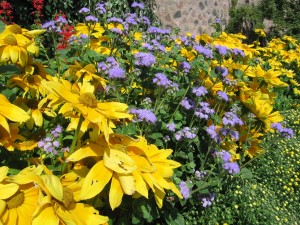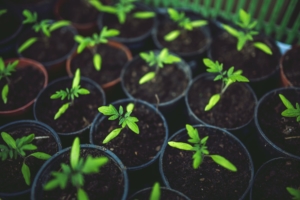A green yard and garden doesn’t always mean it is an eco-friendly one. After all there can be many substances and devices used or actions taken that may create more harm than good in the garden.
With the winter winding down and spring just around the corner, now is a great time to start planning for a few changes in the garden that will help the local ecosystem and contribute to an all-around healthier environment for plants, animals, and people.
Tools
 One of the first things a homeowner will probably do when heading out to the the yard or garden is bring a few tools from the garage or shed. There’s no getting any greener than with items like a rake or pitchfork, but when machines powered by electricity or gasoline like lawn mowers, weed whackers, trimmers and other devices are used, the green barometer starts to change.
One of the first things a homeowner will probably do when heading out to the the yard or garden is bring a few tools from the garage or shed. There’s no getting any greener than with items like a rake or pitchfork, but when machines powered by electricity or gasoline like lawn mowers, weed whackers, trimmers and other devices are used, the green barometer starts to change.
Power-driven tools are there to help us and make the job a little easier, so they can’t be discounted altogether, especially if we wouldn’t be able to do a job without them. Nevertheless, using manual versions whenever possible is ideal for the following reasons:
- Electrically driven tools add stress to local power grids
- More pollution is created by stations run on fossil fuels
- Gasoline driven tools create emissions
- There is always a possibility of a gas spills
Pesticide/Herbicides
Mainstream pesticides and herbicides, substances that kill bugs and unwanted vegetation, usually contain poisonous chemicals that have the following adverse effects:
- These chemicals are not usually selective to the plants or insects they kill
- They will poison the ground and may get washed away into local aquifers
- They can harm children playing around them or animals which eat the affected plants
 With that said, there are cases where you may have to call a Scottsdale exterminator to take care of an infestation or a weed overflow that you are unable to combat alone.
With that said, there are cases where you may have to call a Scottsdale exterminator to take care of an infestation or a weed overflow that you are unable to combat alone.
Otherwise, natural pesticide and herbicide options should be utilized. There are many alternatives including some made from regular household items, so research what may work best for you.
Water usage
If it’s the yard or garden we’re talking about, water is the key to its sustainability. The eco-friendly thing about water, though, is using it efficiently. Since most plants don’t need as much water as we think, it’s important to find ways to distribute the water supply without being wasteful.
 For example, if watering is done in the middle of the day it will dry up quickly. Watering in the early morning hours will dampen soil enough to give roots what they need until evening. Other tips include:
For example, if watering is done in the middle of the day it will dry up quickly. Watering in the early morning hours will dampen soil enough to give roots what they need until evening. Other tips include:
- Mulching around plants to block sun from the ground will keep the roots moist longer
- Installing a rain barrel helps collect water so it doesn’t always have to come from the tap
- Even if water is being taken from the tap, installing a drip irrigation system will distribute the smallest amount of water necessary to your yard and garden.
Not only will some of these steps help the environment, but they may also save you some money. A yard and garden should be one of the most enjoyable places, especially during springtime. This year, consider a greener touch to your garden the eco-friendly way.



